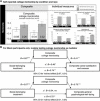A brief social-belonging intervention in college improves adult outcomes for black Americans
- PMID: 32426471
- PMCID: PMC7190359
- DOI: 10.1126/sciadv.aay3689
A brief social-belonging intervention in college improves adult outcomes for black Americans
Abstract
Could mitigating persistent worries about belonging in the transition to college improve adult life for black Americans? To examine this question, we conducted a long-term follow-up of a randomized social-belonging intervention delivered in the first year of college. This 1-hour exercise represented social and academic adversity early in college as common and temporary. As previously reported in Science, the exercise improved black students' grades and well-being in college. The present study assessed the adult outcomes of these same participants. Examining adult life at an average age of 27, black adults who had received the treatment (versus control) exercise 7 to 11 years earlier reported significantly greater career satisfaction and success, psychological well-being, and community involvement and leadership. Gains were statistically mediated by greater college mentorship. The results suggest that addressing persistent social-psychological concerns via psychological intervention can shape the life course, partly by changing people's social realities.
Copyright © 2020 The Authors, some rights reserved; exclusive licensee American Association for the Advancement of Science. No claim to original U.S. Government Works. Distributed under a Creative Commons Attribution NonCommercial License 4.0 (CC BY-NC).
Figures



References
-
- Bowling A., Windsor J., Towards the good life: A population survey of dimensions of quality of life. J. Happiness Stud. 2, 55–82 (2001).
-
- A. Diamond, D. S. Ling, in Cognitive and working memory training: Perspectives from Psychology, Neuroscience, and Human Development, J. M. Novick, M. F. Bunting, M. R. Dougherty, R. W. Engle, Eds. (Oxford University Press, 2020).
-
- G. J. Duncan, R. J. Murnane, Whither opportunity?: Rising inequality, schools, and children’s life chances (Russell Sage, 2011).
-
- Heckman J. J., Skill formation and the economics of investing in disadvantaged children. Science 312, 1900–1902 (2006). - PubMed
-
- Walton G. M., Wilson T. D., Wise interventions: Psychological remedies for social and personal problems. Psychol. Bull. 125, 617–655 (2018). - PubMed
Publication types
MeSH terms
LinkOut - more resources
Full Text Sources
Research Materials

